Welcome to the June 2019 edition of the Curious Tea subscription! Here’s a closer look at the four exciting new teas that we are sharing with our subscribers this month.
The first light tea this month is a lightly oxidised, yet full-bodied Benifuki oolong from Japan.
The second light tea is a Three Moons oolong from northern Vietnam that undergoes complex roasting to simulate an aged tea.
For the dark side of the selection we have a Benifuki Wakocha, a Japanese black tea that has a classic black tea character.
Finally, the last tea we are featuring this month is Da Hong Pao ‘Classic’ Big Red Robe, a famous oolong from Wu Yi Shan in Fujian Province.
- Light: Makinohara Benifuki Oolong and Moc Chau Three Moons Oolong;
- Dark: Makinohara Benifuki Wakocha and Da Hong Pao Classic Big Red Robe;
- Mixed: Makinohara Benifuki Oolong and Makinohara Benifuki Wakocha.
Our Discovery subscription boxes contain 10g taster pouches of all of the above mentioned teas. If you are a subscriber you will benefit from a 10% discount on all teas from our tea shop!
Let’s get into further detail on the products featured in our June tea subscription boxes.
Makinohara Benifuki Oolong
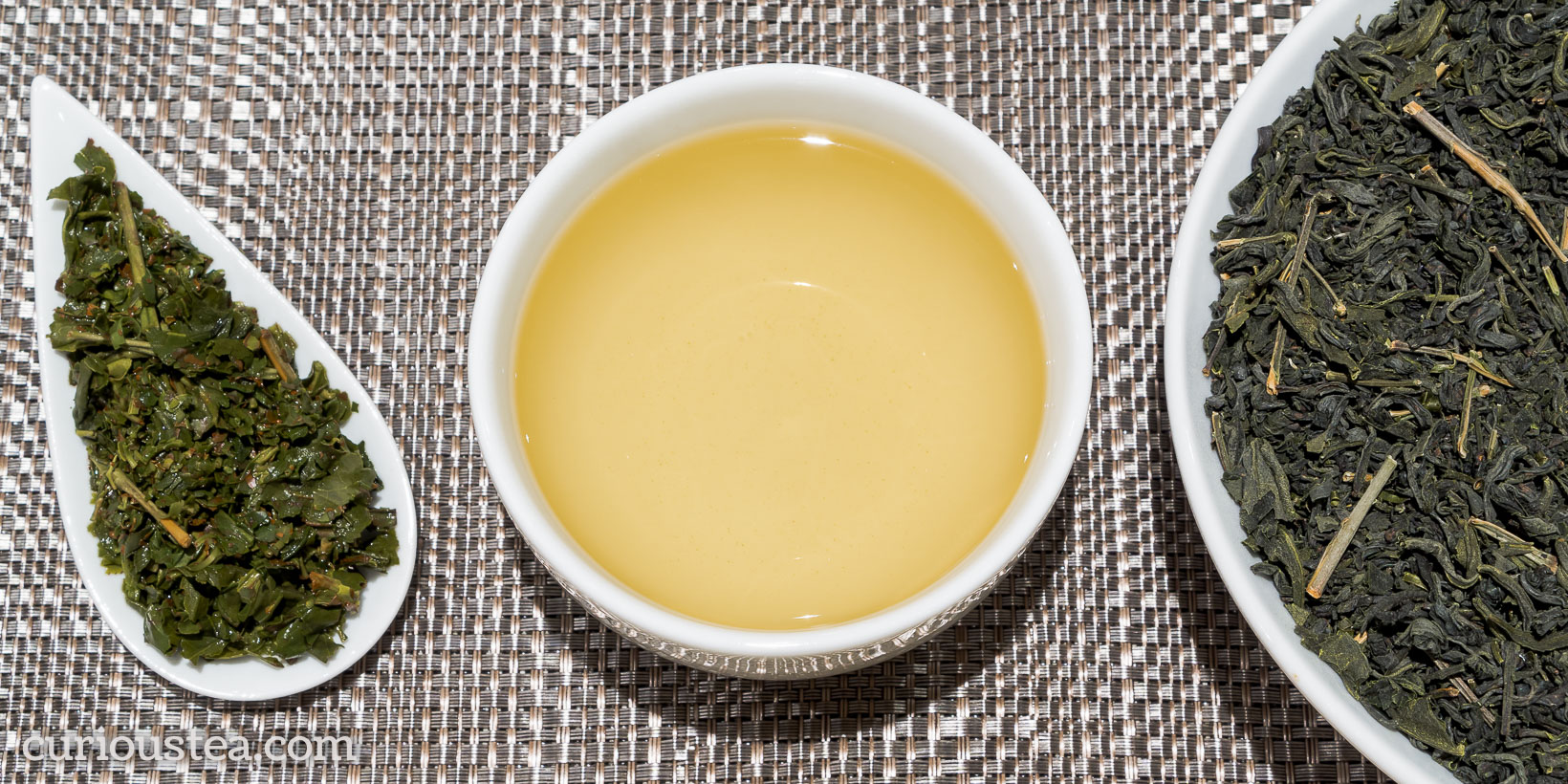
Makinohara Benifūki Oolong (牧之原烏龍茶) is an unusual oolong tea from Japan. Grown at low altitude around Makinohara in Shizuoka Prefecture, it is made from the Benifūki (べにふうき) cultivar. It is grown and processed to organic standards without use of any pesticides. This particular batch is a summer flush tea, harvested in June 2018. Like all of our Makinohara Japanese teas, we source it directly from the grower in Shizuoka.
Japan is particularly known for green tea, with most farmers focusing on producing traditional Japanese teas to meet local and international demand for them. This makes speciality teas like this Benifūki Oolong rather rare and unusual.
The Benifūki cultivar (also often written as Benifuuki in English) is the result of cross-breeding two cultivars in Japan in the 1960’s. The selected cultivars were MakuraCd86, a Camellia sinensis that originated from descendants of Darjeeling plants, and Benihomare that originated from descendants of Camellia assamica plants found in India and Sri Lanka. The actual Benifūki cultivar was registered in Japan only in 1993 but has become rather popular for production of Japanese oolong and black teas.
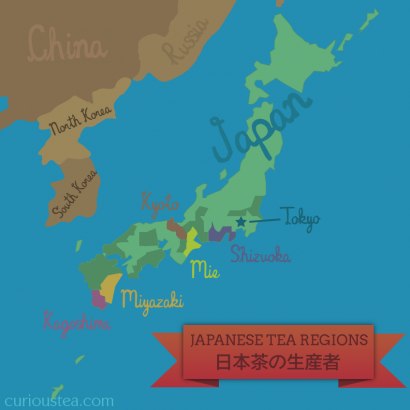
This oolong is a lighter style of oolong and it immediately draws comparison to similar light oolong teas from Taiwan and China. These kind of light yet flavoursome ‘green’ oolong teas are gaining popularity in Japan, in some part due to the global popularity of bubble tea. This tea style is still a rarity in Japan but perhaps we will be seeing more Japanese growers adopting these lighter style oolongs as the local demand for them increases.
The leaves of this Makinohara Benifūki Oolong are of rather mixed size that includes larger and smaller leaf as well as stalks. The liquor produced has a gold-green colour and a lovely floral and vegetal aroma. The taste is bold, with a herbaceous profile. The floral and vegetal character has creamy and peppery notes with a lasting, slightly astringent flavour. There is an orange zest aspect on the aftertaste that makes this tea even more intriguing. This oolong definitely leaves you with a more comforting rather than refreshing sensation.
We find this tea can be a little tricky to brew, with the smaller leaf contributing to a bolder and sometimes more astringent flavour. We suggest brewing at 80°C for 1 minute with multiple infusions. If you are finding the flavours too strong you can decrease the temperature to 70°C or increase the water to leaf ratio.
You can also buy Makinohara Benifuki Oolong tea in our online shop.
Moc Chau Three Moons Oolong
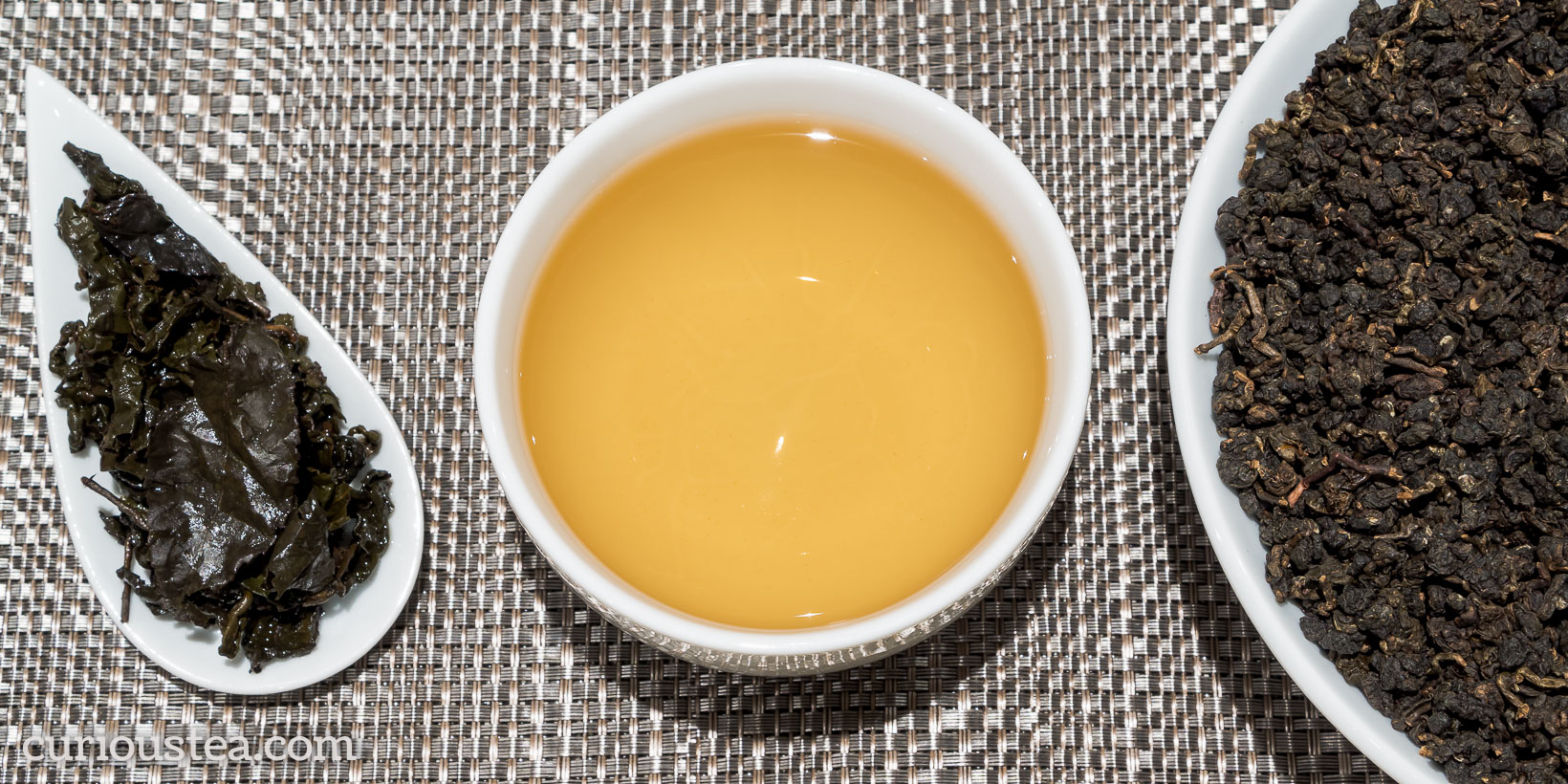
Moc Chau Three Moons Oolong is a complex oolong that is grown in the north of Vietnam, in Mộc Châu district of Sơn La Province. It undergoes multiple roasting, creating a characterful flavour that emulates an aged tea. Three Moons Oolong is grown at a high altitude of around 1,100m on a small tea estate that specialises in growing Taiwanese tea cultivars. April 2018 harvest.
This Three Moons Oolong is hand processed from estate-grown tea trees. The cultivar used is called Thanh Tam locally. It is the same as the Qing Xin ‘Green Heart’ (青心) cultivar, originally brought over from Taiwan. Both Vietnam and Thailand have successful plantations utilising some well-known Taiwanese tea plant cultivars, often with the aim of imitating Taiwanese oolong tea. Most of these are exported to Taiwan or Japan. However some gardens produce some very fine teas that have a unique character of their own.
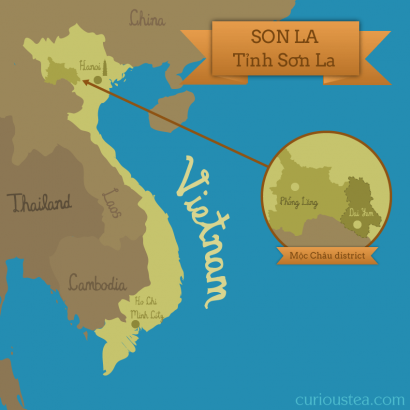
The Qing Xin cultivar is particularly known for the floral aspects of teas that are made from it. The Three Moons name comes from the fact that this tea undergoes multiple roasting and resting over a three-month period. This aims to emulate the flavours of an aged tea. Certainly the skills of the tea master are apparent in the complexities of flavours derived from this processing. The floral aspects of the Qing Xin cultivar are retained, while the roasted elements elevate the tea to a whole new level. The fine balance achieved yields a tea that is flavoursome, multifaceted, comforting and slightly addictive!
We also feature three other Qing Xin oolongs from the same producer in Moch Chau in our shop, which all differ in their processing. It is always a good idea to taste these side by side if possible to gain a better understanding of the way tea processing can completely change the flavour of the original leaf. Our Vietnamese oolong teas from the same producer, made from the same cultivar currently are:
- Moc Chau Green Heart – minimal oxidation and minimal roasting (rolled leaf);
- Moc Chau Three Moons – medium oxidation and medium lengthy roasting (rolled leaf);
- Moc Chau Red Buffalo – heavier oxidation and medium roasting (rolled leaf);
- Moc Chau Dragon Breath – heaviest oxidation and very heavy roasting (twisted strip leaf).
This Moc Chau Three Moons oolong has dark, green-umber, tightly-rolled leaves indicating medium oxidation and roasting. When brewed, these unfurl into large leaves with stalks, typical of this style of oolong. The bright, clear liquor is a golden colour with a floral aroma and creamy, roasted hints. The predominantly floral profile has a smooth, clean taste with floral, fruity, sweet and pronounced roasted flavours. The aftertaste is smooth, a little tangy and mineral. Overall this tea gives a very charming, warming, comforting impression. We love the complexity that this tea exhibits and the fine interplay between the pronounced floral and roasted flavours.
We suggest brewing at 90°C for 3-4 minutes according to your taste. It should be brewed 3+ times depending on your brewing method and taste preferences to fully experience the multitude of flavours.
You can also buy Moc Chau Three Moons Oolong tea in our online shop.
Makinohara Benifuki Wakocha
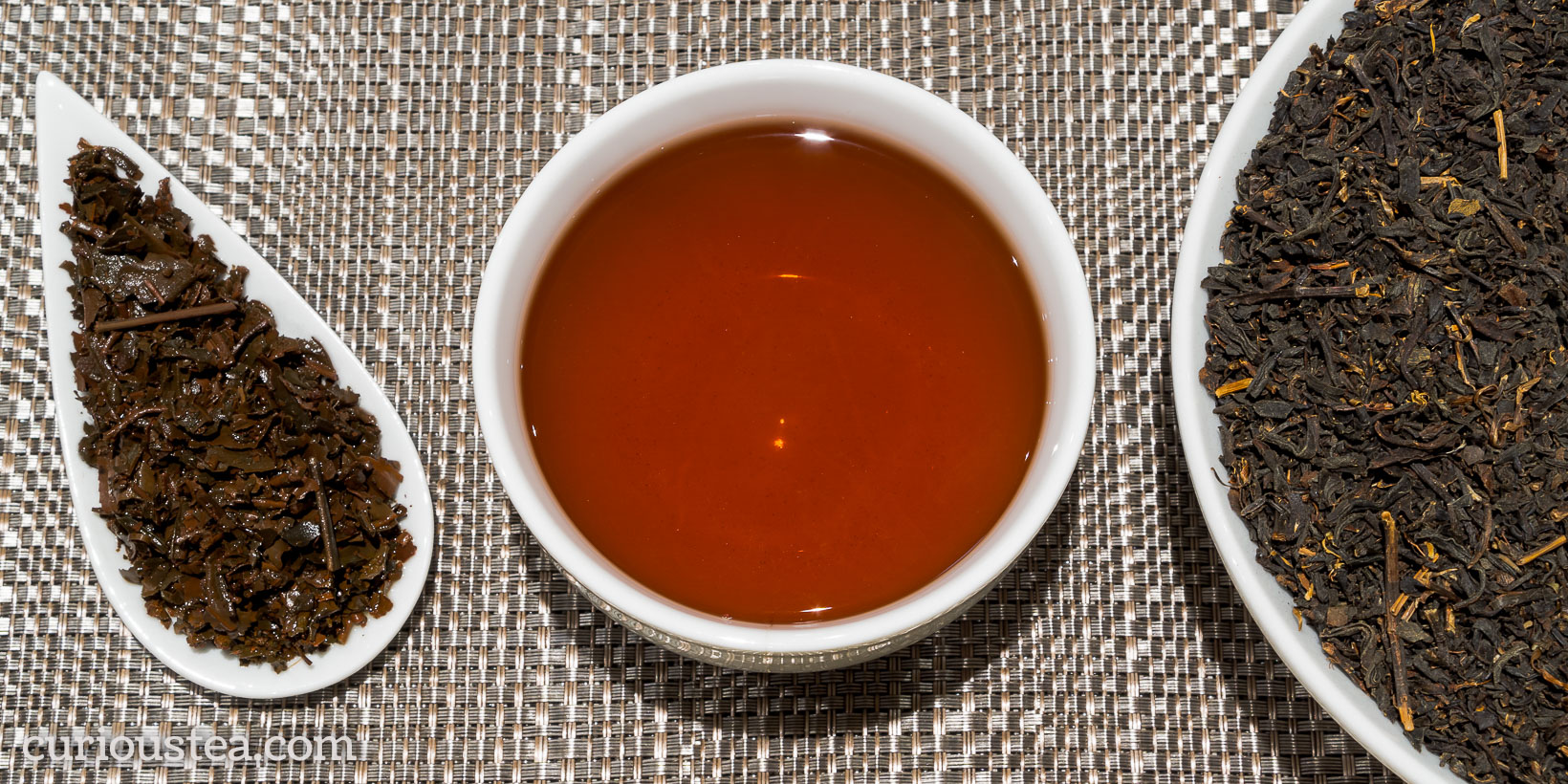
Makinohara Benifūki Wakocha (牧之原和紅茶) is an unusual black tea from Japan. Grown at low altitude around Makinohara in Shizuoka Prefecture, it is made from the Benifūki (べにふうき) cultivar. It is grown and processed to organic standards without use of any pesticides. This particular batch is a second flush tea, harvested in May 2018. Like all of our Makinohara Japanese teas, we source it directly from the grower in Shizuoka.
Japan is particularly known for green tea, with most farmers focusing on producing traditional Japanese teas to meet local and international demand for them. This makes speciality teas like this Benifūki Wakocha rather rare and unusual.

The Benifūki cultivar (also often written as Benifuuki in English) is the result of cross-breeding two cultivars in Japan in the 1960’s. The selected cultivars were MakuraCd86, a Camellia sinensis that originated from descendants of Darjeeling plants, and Benihomare that originated from descendants of Camellia assamica plants found in India and Sri Lanka. The actual Benifūki cultivar was registered in Japan only in 1993 but has become rather popular for production of Japanese oolong and black teas.
The leaves of this Makinohara Benifūki Wakocha are of rather mixed size that includes larger and smaller leaves as well as some stalks. The smaller size of the leaf can be quite fine, making this tea ideal for a strong brew if desired. It produces a dark ruby liquor with a malty and lightly fruity aroma. The mineral profile has a classic black tea character, showing the strength and suitability of the Benifūki cultivar for black tea production. There are satisfying malty and fruity notes with savoury, peppery hints. The lightly metallic and tangy aftertaste completes the flavour profile. This wakocha black tea reminds us of a good, balanced English Breakfast tea.
We suggest brewing at 90°C for 2 minutes with multiple infusions. You can definitely brew this tea for longer to create a bolder and stronger infusion. In such case we can suggest that a drop of milk might be a good idea (the producer of this tea certainly thinks so!).
You can also buy Makinohara Benifuki Wakocha tea in our online shop.
Da Hong Pao Classic Big Red Robe
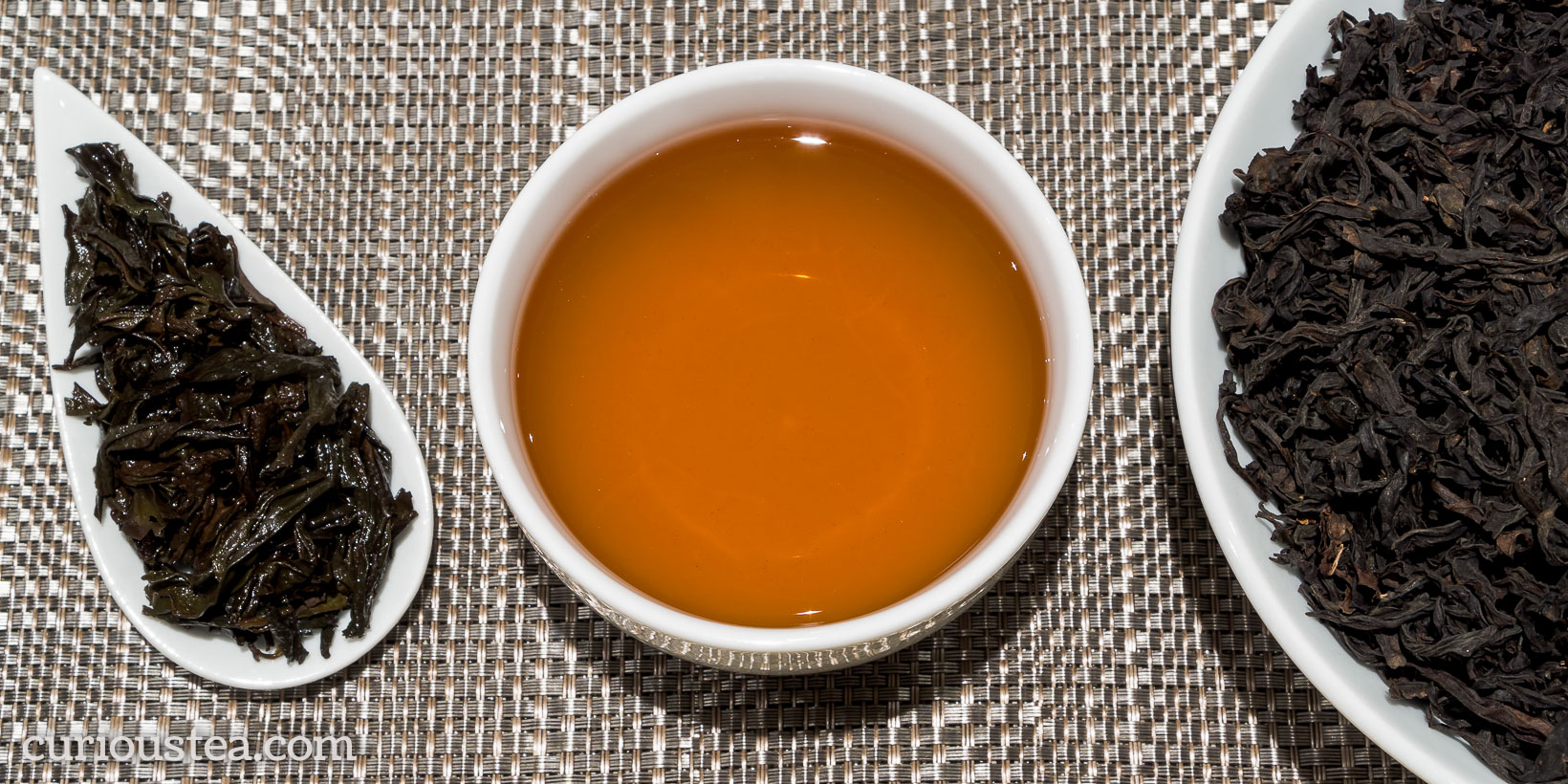
Da Hong Pao (大紅袍) Big Red Robe is a famous Wu Yi Rock oolong from Fujian Province in China. This ‘Classic’ version is a fine grade tea that has a typical roasted character and a mineral profile with comforting floral and savoury notes. This particular lot was harvested in late April 2018.
This Da Hong Pao is a ‘Classic’ version of our Big Red Robe oolong. In our case this refers to a ‘fine’ grade (Gao Ji 高级) tea. We also stock a ‘Special’ version of our Big Red Robe oolong, which is a ‘super-fine’ grade (Te Ji 特级). If you tried a Da Hong Pao oolong from our shop prior to June 2019, it would have been the higher grade ‘Special’ Big Red Robe oolong.
Da Hong Pao oolong is amongst the most popular and recognised Wu Yi Rock teas. These are also sometime referred to by their English name ‘Bohea’. As historically the term Bohea was used to apply to lower grades of tea, the preferred term for teas coming out of this terroir is Wu Yi tea or Wu Yi Rock (Wu Yi Shan) tea. Wu Yi teas are grown on rocky mountainsides where the soil is high in mineral content and the growth of the tea trees is much slower. This terroir results in a distinctive ‘rock’ taste that is prized amongst tea lovers for the characteristic profile that is stony and mineral in taste but features a long lasting sweet aftertaste.
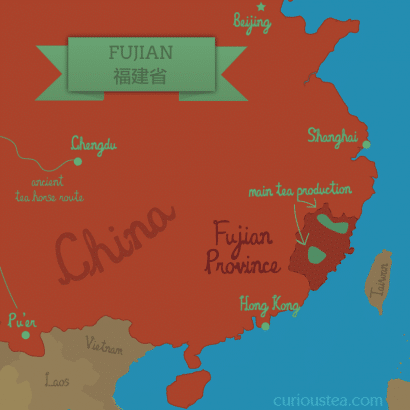
There is a main core area of Wu Yi Rock tea production, known as Zhengyan (正岩), as well as peripheral areas known as Banyan (半岩) and Zhou Cha (洲茶). This lot comes from tea plants that are clones of original mother trees, grown on the periphery of Wu Yi Shan in Banyan, rather than in the core production area. The teas from Banyan (sometimes Danyan) are also known as half-rock teas and they closely match the quality of the core area Zhengyan teas. They represent a great combination of value and tradition; they utilise the correct cultivars, processing and a terroir closely matched to the core production area while still retaining an excellent value.
Our Da Hong Pao ‘Classic’ Big Red Robe has a wonderfully balanced Wu Yi Rock character with a good degree of the classic mineral ‘Rock’ taste. While our ‘Special’ version is definitely a bit more complex and refined, this ‘Classic’ version offers a great insight into a famous, classic Da Hong Pao flavour. The dark twisted leaves have a distinctive roasted aroma. They produce a dark amber liquor with a comforting roasted aroma. We always find that this tea is best after about 6-12 months rest from production date to allow the flavour to mellow and balance. The taste of this Da Hong Pao is brisk, mineral, with soothing roasted flavours. There are lightly sweet, floral notes, a touch of maltiness and a nice savoury and lightly metallic edge on the aftertaste. We also detect the slightest hint of tobacco on the very top notes!
We suggest brewing parameters of 90°C for 3-4 minutes according to your taste, brewing 3 or more times.
You can also buy Da Hong Pao Classic Big Red Robe oolong tea in our online shop.
We really do hope that you enjoy the tea selection for June and are looking forward to the next selection in our next box! Our July box will feature a Thai Milk Oolong, a Taiwanese Red Jade White tea, a Chinese fermented Liu Bao from Guangxi Province and a classic Chinese Keemun Mao Feng!
If reading this has made you curious about our teas, but you don’t yet subscribe to a monthly tea selection, you can sign up for our tea boxes in just a few clicks. We ship worldwide from London, UK.
We always love to hear from you, so if you have any questions, suggestions or just want to chat about tea, email us at contact@curioustea.com, via our Facebook page or via Twitter.
You can also follow us on Instagram for pretty tea photos.
Happy tea discoveries!

